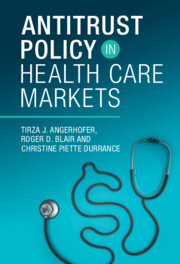Book contents
- Antitrust Policy in Health Care Markets
- Antitrust Policy in Health Care Markets
- Copyright page
- Dedication
- Contents
- Figures
- Tables
- Acknowledgments
- Table of Cases
- 1 Health Care Markets and Competition Policy
- 2 Antitrust Policy in the United States
- Part I Monopoly
- Part II Seller Cartels
- 6 Collusion in Health Care Markets
- 7 Collusion in Generic Drug Markets
- 8 The Hatch-Waxman Act, Patent Infringement Suits, and Reverse Payments
- 9 The Alleged Insulin Conspiracy
- 10 Licensing of Health Care Professionals
- Part III Monopsony
- Part IV Buyer Cartels
- Part V Mergers and Acquisitions
- Index
- References
10 - Licensing of Health Care Professionals
from Part II - Seller Cartels
Published online by Cambridge University Press: 24 November 2022
- Antitrust Policy in Health Care Markets
- Antitrust Policy in Health Care Markets
- Copyright page
- Dedication
- Contents
- Figures
- Tables
- Acknowledgments
- Table of Cases
- 1 Health Care Markets and Competition Policy
- 2 Antitrust Policy in the United States
- Part I Monopoly
- Part II Seller Cartels
- 6 Collusion in Health Care Markets
- 7 Collusion in Generic Drug Markets
- 8 The Hatch-Waxman Act, Patent Infringement Suits, and Reverse Payments
- 9 The Alleged Insulin Conspiracy
- 10 Licensing of Health Care Professionals
- Part III Monopsony
- Part IV Buyer Cartels
- Part V Mergers and Acquisitions
- Index
- References
Summary
Health care professions are regulated by state licensing boards, which are charged with promoting public health, safety, and welfare by preventing charlatans, incompetents, and quacks from practicing. Typically, these boards are populated by members of the profession being regulated since they have the requisite expertise to police the profession. However, professionals with the power to grant licenses may have a financial incentive to use that power to reduce competition and exclude other medical professionals. Reduced competition leads to higher prices and reduced access to health care. Concerned about this conflict of interest, the Supreme Court in North Carolina Dental agreed that the state should supervise such boards through the state action doctrine. In this chapter, we explore the competitive concerns economists and the antitrust Agencies have regarding professional licensure regulations. We identify two general antitrust concerns: (1) the exclusion of some competitors through entry limitations or practice restrictions and (2) supervision requirements that make the employment of competitors less attractive.
- Type
- Chapter
- Information
- Antitrust Policy in Health Care Markets , pp. 230 - 254Publisher: Cambridge University PressPrint publication year: 2022

